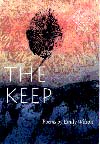
The poems in The Keep are influenced by art, by paintings, by “thinking about abstraction and figuration and the space between, beauty apprehended and lost, the divine apprehended and lost.” Emily Wilson's poems are also saturated with nature; from “the great oaks emptying, russet, gusseted” to “the caribou mov[ing] through us beyond numerous,” each image connects the natural world of tides and marshes and forests to the human world of documentation and preservation. The image of the keep as a place of safety and as a kind of prison also informs this very strong collection.

Marian Alexander Spencer was born in 1920 in the Ohio River town of Gallipolis, Ohio, one year after the “Red Summer” of 1919 that saw an upsurge in race riots and lynchings. Following the example of her grandfather, an ex-slave and community leader, Marian joined the NAACP at thirteen and grew up to achieve not only a number of civic leadership firsts in her adopted home city of Cincinnati, but a legacy of lasting civil rights victories.
Of these, the best known is the desegregation of Cincinnati’s Coney Island amusement park. She also fought to desegregate Cincinnati schools and to stop the introduction of observers in black voting precincts in Ohio. Her campaign to raise awareness of industrial toxic-waste practices in minority neighborhoods was later adapted into national Superfund legislation.
In 2012, Marian’s friend and colleague Dot Christenson sat down with her to record her memories. The resulting biography not only gives us the life story of remarkable leader but encapsulates many of the twentieth century’s greatest struggles and advances. Spencer’s story will prove inspirational and instructive to citizens and students alike.
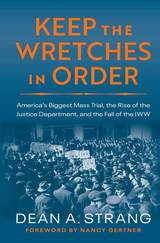
In the first legal history of this federal trial, Dean Strang shows how the case laid the groundwork for a fundamentally different strategy to stifle radical threats, and had a major role in shaping the modern Justice Department. As the trial unfolded, it became an exercise of raw force, raising serious questions about its legitimacy and revealing the fragility of a criminal justice system under great external pressure.
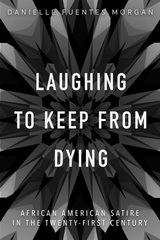
Adventurous and perceptive, Laughing to Keep from Dying reveals how African American satirists unmask the illusions and anxieties surrounding race in the twenty-first century.


Simultaneously communicating the vital importance of access to books and education, and conveying the power of community, the letters sent to APBP by incarcerated people spark conversations about race, poverty, and incarceration and shed light on the movement for accountability for state violence. This Book Is Free and Yours to Keep elucidates the violence and neglect perpetuated by carceral systems and offers a way forward based on solidarity and collaboration.
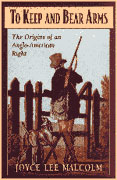
Joyce Malcolm illuminates the historical facts underlying the current passionate debate about gun-related violence, the Brady Bill, and the NRA, revealing the original meaning and intentions behind the individual right to “bear arms.” Few on either side of the Atlantic realize that this extraordinary, controversial, and least understood liberty was a direct legacy of English law. This book explains how the Englishmen’s hazardous duty evolved into a right, and how it was transferred to America and transformed into the Second Amendment.
Malcolm’s story begins in turbulent seventeenth-century England. She shows why English subjects, led by the governing classes, decided that such a dangerous public freedom as bearing arms was necessary. Entangled in the narrative are shifting notions of the connections between individual ownership of weapons and limited government, private weapons and social status, the citizen army and the professional army, and obedience and resistance, as well as ideas about civilian control of the sword and self-defense. The results add to our knowledge of English life, politics, and constitutional development, and present a historical analysis of a controversial Anglo-American legacy, a legacy that resonates loudly in America today.
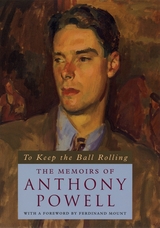
Powell did eventually reveal himself in four volumes of memoirs, published between 1976 and 1982. This edition of Anthony Powell's Memoirs is an abridged and revised version of those volumes, a version that has never before been published in this form in the United States. The result is not only a fascinating view of Powell as a man and an author but also a unique history of British literary society and the social elite Powell lampooned and moved within from the twenties through the eighties. From Eton and Oxford to his life as a novelist and critic, Powell observes all—the obscenity trial sparked by Lady Chatterley's Lover; Shirley Temple's libel suit after Graham Greene reviewed Wee Willie Winkie "with even more than his usual verve"—and paints vivid portraits of Kingsley Amis, V.S. Naipaul, T.S. Eliot, Virginia Woolf, and countless others. Most importantly, Powell's lively memoirs banish all thought of the man as a relic of the British gentry. He was a modernist, a Tory, and more than a little interested in genealogy and peerage, but a man who, according to Ferdinand Mount, "miraculously knew what life was like."

To Keep the Republic is a wake-up call about the responsibilities that come with being a citizen in a participatory democracy. It describes the many ways that individuals can make a difference on both local and national levels—and explains why they matter. Political scientist Elizabeth C. Matto highlights the multiple facets of democratic citizenship, identifies American democracy’s sometimes competing values and ideals, and explains how civic engagement can take various forms, including political conversation. Combining political philosophy with concrete suggestions for how to become a more engaged citizen, To Keep the Republic reminds us that democracy is not a spectator sport; it only works when we get off the sidelines and enter the political arena to make our voices heard.
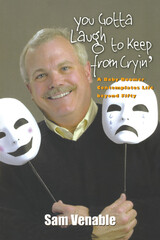
The way Venable figures it, he’s roaring along the road (at about twenty-seven miles per hour, the average speed for someone his age) to Codgerville. You Gotta Laugh to Keep From Cryin’ highlights the observations and lifestyle changes (and a few other things he can’t quite seem to remember at the moment) that Venable has made along the way.
From the day his wife discovers his first ear hair, Venable begins to recognize the signs of old age. Though he had reconciled himself to daily fiber and a distinguished head of gray, he is one step further to an insatiable desire for cafeteria food and permanently leaving his car’s right turn signal flashing.
The news isn’t all bad, though. To his surprise, Venable discovers that his new appearance and habits have qualified him for the senior discount on breakfast at his favorite restaurant. After reading about a scientific study concluding that men’s brains shrink faster than women’s in the normal aging process, Venable has a new source of excuses to explain to his wife why he is missing important dates, times, places, and appointments.
As an official CIT (Codger In Training), Venable delights in other newfound freedoms. He can stand in a fast-food line and stare at the menu for a full two minutes without saying a word (besides, he can’t hear the people behind him grumbling). He can drive as slowly as he likes and has perfected the art of maintaining a death grip on the steering wheel of his car. And he really doesn’t have to listen to anyone anymore; he can merely turn their way from time to time and mumble, “Huh?”
From the swinging doors whose “Push/Pull” directions elude him to the high-tech mysteries of ATMs designed to baffle the elderly, Sam Venable’s rollicking view of life after fifty will leave readers laughing and happy to be a member of the AARP set.
The Author: Sam Venable, recognized for his humor writing in 2000, 2001, and 2002 by the Tennessee Press Association, is a columnist for the Knoxville News-Sentinel. He is the author of a number of books, including Rock-Elephant: A Story of Friendship and Fishing and Mountain Hands: A Portrait of Southern Appalachia. He lives in Knoxville, Tennessee.
READERS
Browse our collection.
PUBLISHERS
See BiblioVault's publisher services.
STUDENT SERVICES
Files for college accessibility offices.
UChicago Accessibility Resources
home | accessibility | search | about | contact us
BiblioVault ® 2001 - 2024
The University of Chicago Press









